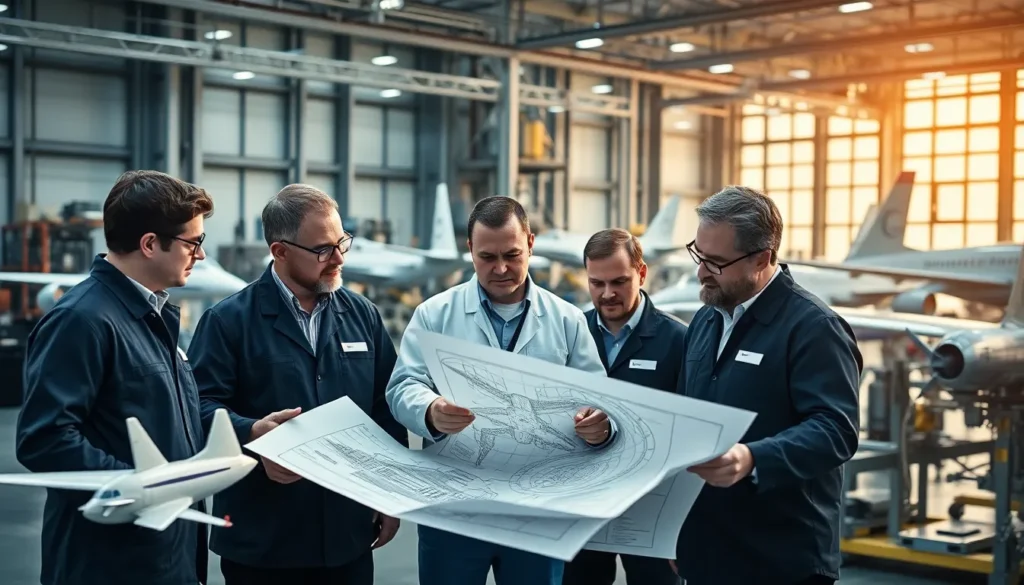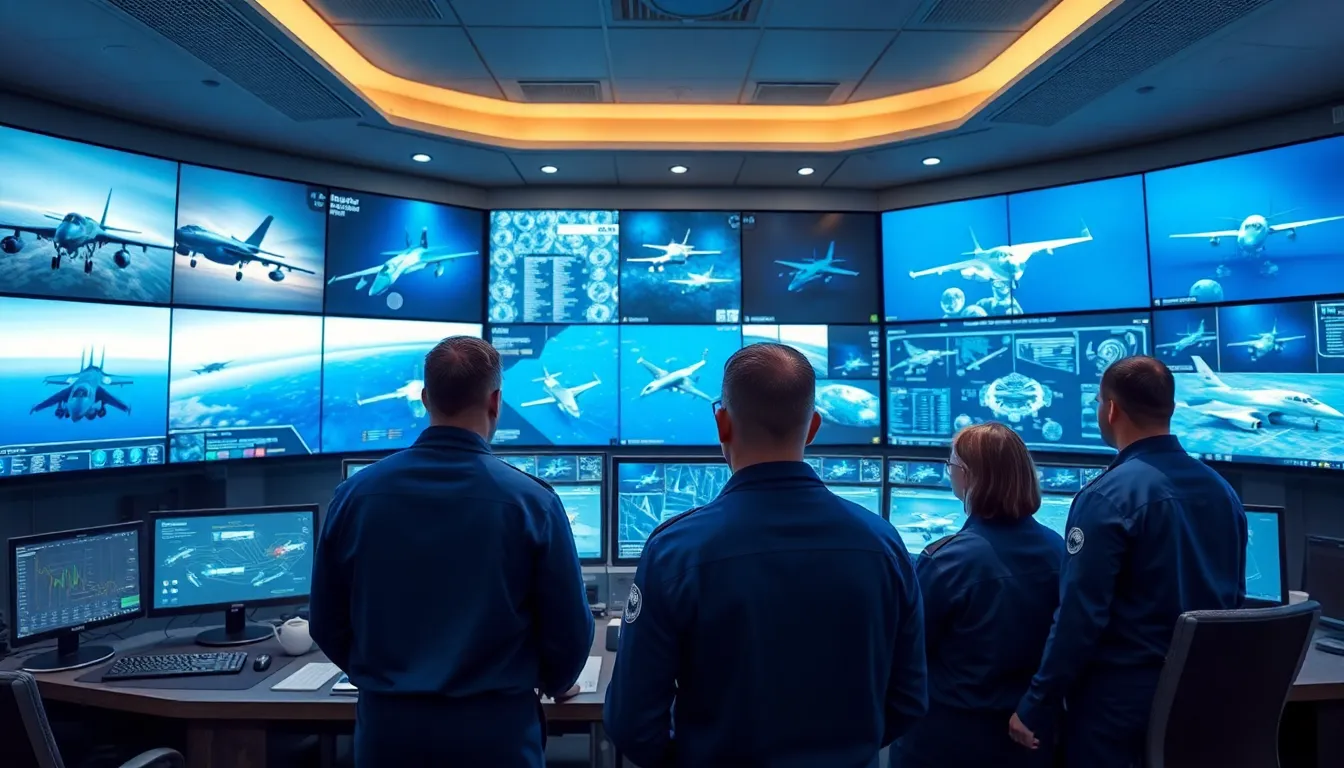Table of Contents
Toggle
In the realm of defense and aerospace, few names resonate as powerfully as Lockheed Martin. This industry giant not only leads in innovative technologies but also sets the standard for security solutions globally. As nations invest heavily in defense capabilities, understanding the landscape of companies that operate alongside Lockheed Martin is crucial for grasping the future of military and aerospace advancements.
Numerous firms mirror Lockheed Martin’s commitment to innovation, offering cutting-edge products and services in defense, space exploration, and advanced technology. These companies play pivotal roles in shaping military strategies and enhancing national security. Exploring this competitive landscape reveals a wealth of opportunities and advancements that drive the industry forward, highlighting the importance of collaboration and competition in meeting the ever-evolving demands of global security.
Companies Like Lockheed Martin
Numerous companies operate within the same realms as Lockheed Martin, contributing to defense, aerospace, and technology sectors. These companies play vital roles in developing advanced technologies and solutions to meet global security needs.
Boeing
Boeing focuses on commercial and military aircraft, space systems, and defense solutions. The company’s extensive experience in aerospace engineering has positioned it as a formidable rival in both commercial and defense markets.
Northrop Grumman
Northrop Grumman specializes in aerospace and defense technologies, providing unmanned systems and cyber solutions. Its commitment to innovation has led to advancements in missile defense systems and space exploration technologies.
Raytheon Technologies
Raytheon Technologies excels in providing advanced missile systems and electronic warfare technologies. The company’s focus on integrated defense solutions enhances its competitive position in the global defense market.
General Dynamics
General Dynamics operates across multiple sectors, including defense and security. It produces submarines, armored vehicles, and advanced communication systems, catering to both military and civilian applications.
Thales Group
Thales Group emphasizes security and defense technologies, including avionics and telecommunications. The company’s global presence reinforces its ability to address diverse client needs in various sectors.
Airbus
Airbus competes in the aerospace sector, designing and manufacturing commercial and military aircraft. Its innovations in airliner design and development align with global aerospace demands and security requirements.
L3Harris Technologies
L3Harris Technologies integrates communication technologies with defense applications. Its expertise in satellite communications and tactical systems strengthens its role in the defense landscape.
These companies collectively form a competitive ecosystem that enhances technological advancements and collaborative efforts in the fields of defense and aerospace. Each organization contributes unique capabilities, reinforcing the ongoing evolution of global security solutions.
Major Competitors in Aerospace and Defense

Lockheed Martin faces competition from several prominent companies in the aerospace and defense sector, each contributing to advancements in technology and defense solutions.
Northrop Grumman
Northrop Grumman specializes in unmanned systems, cyber solutions, and advanced defense technologies. The company develops the Global Hawk unmanned aerial vehicle (UAV) and the B-21 Raider stealth bomber. Northrop Grumman excels in providing satellite and space systems as well, addressing both national security and commercial needs. The company’s focus on innovation in cyber defense positions it as a key player in addressing modern threats.
Boeing
Boeing operates as a leader in both commercial and military aircraft markets. The company manufactures various aircraft, including the F/A-18 Super Hornet fighter jet and the P-8 Poseidon maritime patrol aircraft. Boeing’s extensive research and development efforts in next-generation aircraft and space exploration further solidify its role in the defense industry. By integrating advanced technologies like artificial intelligence and automation, Boeing enhances operational efficiency and safety in its aircraft systems.
Emerging Players in the Industry
Several emerging players are making significant contributions to the defense and aerospace industry, competing with giants like Lockheed Martin. This section presents key insights into Raytheon Technologies and General Dynamics, highlighting their roles and advancements in the sector.
Raytheon Technologies
Raytheon Technologies focuses on providing advanced missile systems, electronic warfare, and defense technologies. It specializes in solutions like the Tomahawk cruise missile and the Patriot air and missile defense system, which enhance national security. The company’s recent efforts in integrating artificial intelligence into defense systems demonstrate its commitment to innovation. Raytheon Technologies also collaborates with various government entities and international partners, expanding its global presence and reinforcing its position as a key player in defense solutions.
General Dynamics
General Dynamics plays a crucial role in producing advanced defense equipment and technology. The company develops a wide range of platforms, including combat vehicles, submarines, and communication systems. Notable products include the M1 Abrams tank and the Virginia-class submarine, showcasing its engineering capabilities. General Dynamics also emphasizes cybersecurity solutions and data analytics, addressing the evolving threats in modern warfare. Its strategic partnerships and investments in research and development contribute to maintaining competitiveness in the dynamic defense landscape.
Specialization and Innovations
Companies like Lockheed Martin showcase their unique specializations and innovations in defense and aerospace, driving advancements in technology and security solutions. This section highlights key focus areas and contributions to the space sector.
Focus Areas in Defense Technology
- Boeing: Boeing focuses on developing both commercial and military aircraft, with products like the F/A-18 Super Hornet and P-8 Poseidon. The company emphasizes next-generation aircraft technologies, incorporating artificial intelligence for enhanced operational efficiency.
- Northrop Grumman: Northrop Grumman specializes in unmanned systems, cyber solutions, and satellite systems. Notable developments include the Global Hawk UAV and B-21 Raider stealth bomber, advancing capabilities in reconnaissance and strike missions.
- Raytheon Technologies: Raytheon Technologies excels in missile systems and electronic warfare, producing key assets such as the Tomahawk cruise missile and Patriot air defense system. The company’s integration of artificial intelligence enhances targeting and decision-making processes.
- General Dynamics: General Dynamics is known for its comprehensive range of defense equipment, including the M1 Abrams tank and Virginia-class submarine. The company also emphasizes cybersecurity and data analytics to protect critical defense infrastructure.
- Thales Group: Thales Group focuses on security solutions, offering advanced technologies in communications, surveillance, and cyber defense. Their innovative offerings improve situational awareness and threat detection capabilities.
- Airbus: Airbus competes in aircraft design, manufacturing both commercial airliners and military transport solutions. The company’s focus on innovative materials and fuel-efficient aircraft contributes to sustainable aviation.
- L3Harris Technologies: L3Harris integrates communication technologies into defense applications, developing secure and resilient systems for military operations. Their innovations support interoperability and mission success in complex environments.
Contributions to Space Exploration
- Boeing: Boeing contributes to space exploration by developing systems for human spaceflight, including the CST-100 Starliner spacecraft. This system is designed to transport astronauts to the International Space Station (ISS) and beyond.
- Northrop Grumman: Northrop Grumman’s Cygnus spacecraft supplies the ISS with essential cargo, supporting research and technology development in microgravity environments. Their work on the James Webb Space Telescope enhances astronomical observation capabilities.
- Raytheon Technologies: Raytheon Technologies develops advanced sensors for space applications, enhancing satellite capabilities for Earth observation and defense purposes. Their technologies drive improvements in data collection and analysis.
- General Dynamics: General Dynamics supports space exploration through satellite communications and technology integration, enhancing connectivity and operational flexibility for space missions.
- Thales Group: Thales Group designs instruments and payloads for space applications, contributing to satellite navigation and Earth observation systems. Their innovations support scientific research and commercial applications.
- Airbus: Airbus plays a crucial role in developing satellites and space systems, including the European Space Agency’s missions. Their focus on enhancing satellite technology supports various scientific and commercial endeavors.
- L3Harris Technologies: L3Harris provides communication and electronic systems for space applications, enhancing security and data transmission for satellite networks. Their innovations facilitate strategic operational capabilities in space.
Conclusion
The landscape of defense and aerospace is shaped by numerous companies that drive innovation and technology. Firms like Boeing, Northrop Grumman, and Raytheon Technologies not only compete with Lockheed Martin but also collaborate to enhance global security. Their diverse specializations contribute to advancements in military systems, space exploration, and cybersecurity.
As the industry continues to evolve, the synergy between these companies will be crucial in addressing emerging challenges. Understanding their roles and innovations provides valuable insight into the future of defense and aerospace, ensuring that advancements keep pace with the demands of a complex global environment.















